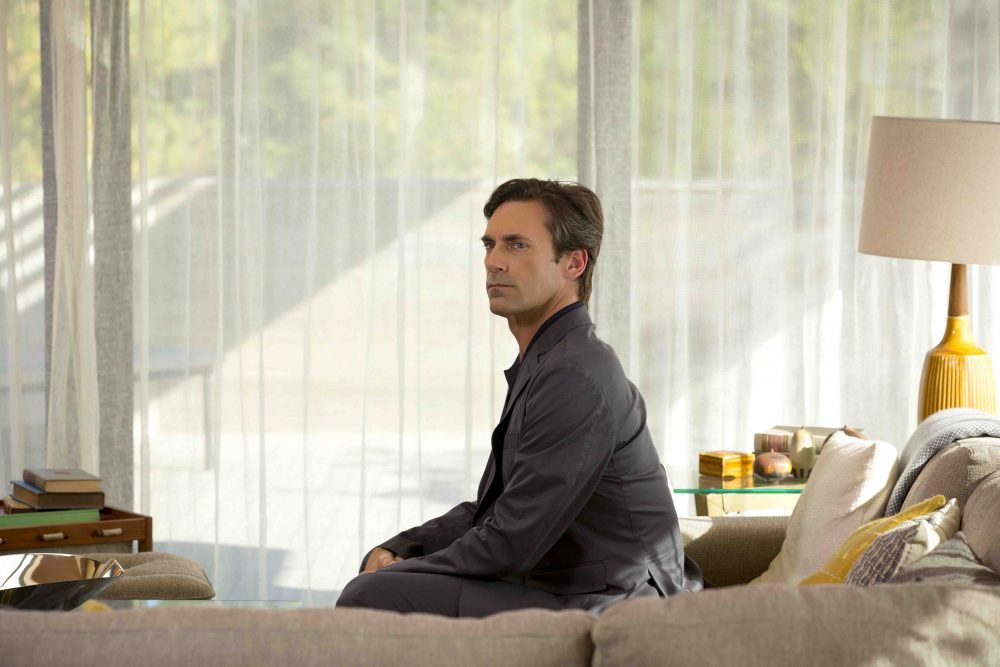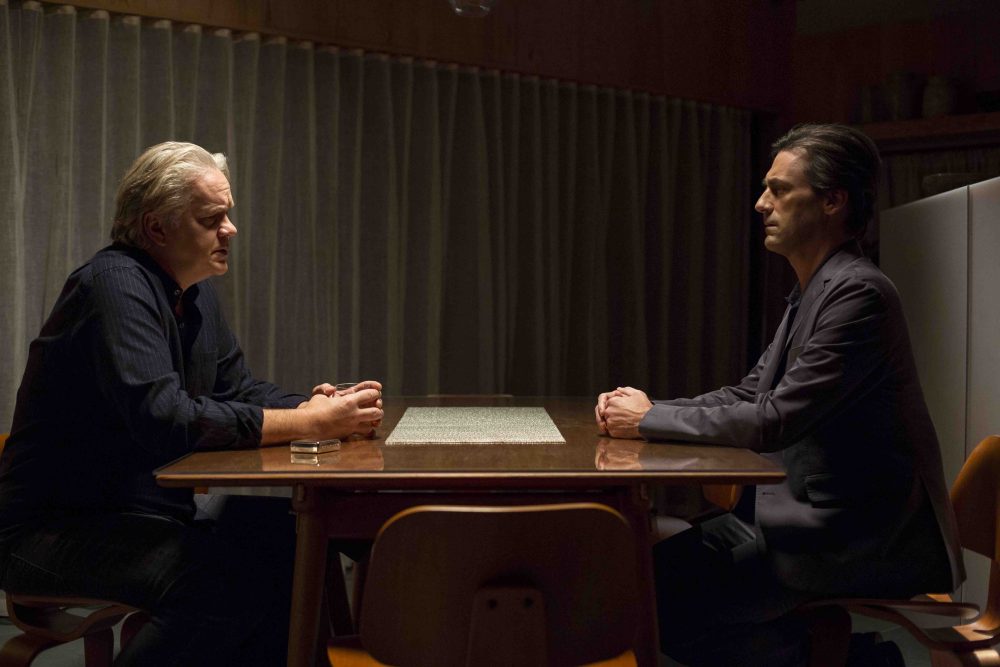Advertisement
Review
'Marjorie Prime' Contemplates The Infinite Without Leaving The Living Room

Nineteenth century philosopher-psychologist William James theorized that the human memory was constantly, imperfectly replicating itself. According to James, when you remember something, you’re actually remembering the last time you remembered it, so blurs and distortions become inevitable over time.
This theory gets a workout in “Marjorie Prime,” director Michael Almereyda’s captivating film adaptation of Jordan Harrison’s Pulitzer-nominated off-Broadway play. Here’s a science-fiction story without any special effects — a movie that conjures contemplation of the infinite while seldom leaving a living room. One of my favorites from this year’s Sundance Film Festival, "Marjorie Prime" is getting an exclusive Boston-area premiere at Arlington’s Regent Theatre this weekend.

Set in the not-too-distant future, the film stars Jon Hamm as Walter Prime, an artificially intelligent hologram purchased to provide company for Marjorie (Lois Smith), a well-off woman in her 80s entering the later stages of Alzheimer’s. He’s been programmed to resemble her long-deceased husband, whom we are told "had a good, strong chin and was a bit too pleased with himself." (Hamm couldn’t be more perfectly cast.)
Walter begins as a blank slate, slowly accumulating biographical information and family anecdotes, most provided by Marjorie’s son-in-law, Jon (Tim Robbins), who troublingly sometimes seems to think the hologram is his drinking buddy. His prickly wife Tess (Geena Davis) wants nothing to do with this nonsense, and is understandably creeped out by an overly solicitous apparition of her dead father hanging out in the living room.

It’s a marvelous piece of writing, smart and funny with even the most casual conversations ping-ponging back to the film’s slippery central questions about the malleability of memory, and how a family’s story tends to change depending on who’s telling it. As I’m told was the case with Harrison’s play, Almereyda’s adaptation avoids exposition almost entirely. The movie drops us into Walter’s shoes, picking up scraps of information here and there from increasingly unreliable sources while we’re trying to put together the bigger picture.
It’s up to us to time out when certain events took place according to hints in the dialogue. (We hear that Walter first proposed to Marjorie after going to see the Julia Roberts vehicle “My Best Friend’s Wedding,” and that another key moment occurred during “The Gates” exhibition in Central Park.) Almereyda conveys the film’s abrupt passages of time through sly visual means, like when we notice that a pet puppy has suddenly become a large dog. This is an invigoratingly adult way to treat an audience, and as a result you feel active while you’re watching “Marjorie Prime” — engaged in a way you don’t at films that lazily spell everything out for you.
I can’t remember the last time I saw Geena Davis in a movie but it was far too long ago. The tightly wound Tess could very easily have been played as a wet blanket, but Davis brings a sincere longing to the curt interactions with her ailing mother, weighed down by the knowledge that Alzheimer’s has robbed these two of the chance to finally have conversations that should have taken place years ago. There’s a stunning moment late in the film, in which Davis’ face fills the frame in close-up listening to The Band’s “I Shall Be Released,” that reminds you what screen acting is supposed to be about.

Though mostly confined to the living room of a beach house presumably somewhere in the Hamptons, Almereyda and the brilliant young cinematographer Sean Price Williams combat the material’s inherent staginess by varying the outdoor environments and blocking the characters so that quite often they appear to be having conversations with the other’s reflections in the massive floor-to-ceiling windows. It’s a nifty thematic match for the movie’s riffs on incomplete representations, but then again this director is an old hand at that sort of thing. (Almereyda’s terrific 2000 take on “Hamlet” had Ethan Hawke’s melancholy Dane reciting the “to be or not to be” in the “Action” section of a Blockbuster Video store.)
There’s a sense in which “Marjorie Prime” is all about those reflections, and our compulsion to edit our own histories, turning the revisions into “facts” over time. The film asks who gets to preserve custody of memories, both precious and otherwise, particularly in the face of a disease that eradicates recollection altogether. Ironically enough, it's the kind of movie you won't soon forget.
"Marjorie Prime" premieres at the Regent Theatre in Arlington from Friday, Aug. 18 through Sunday, Aug. 20.
